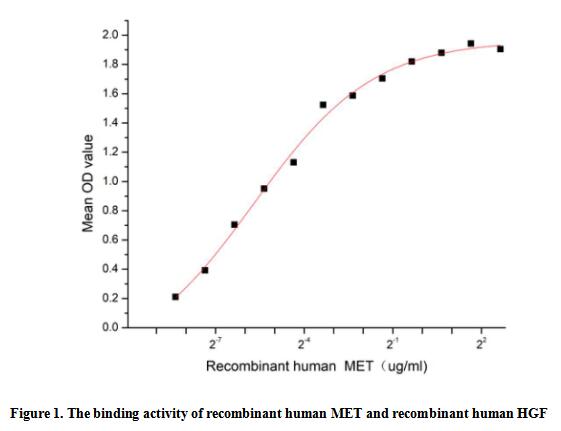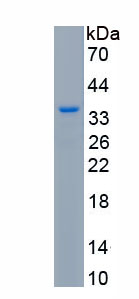Active C-Met (MET)
HGFR; RCCP2; Hepatocyte Growth Factor Receptor; Met Proto-Oncogene; Mesenchymal-Epithelial Transition Factor; HGF/SF receptor; Proto-oncogene c-Met; Scatter factor receptor; Tyrosine-protein kinase M
- Product No.APC186Hu01
- Organism SpeciesHomo sapiens (Human) Same name, Different species.
- Buffer FormulationPBS, pH7.4, containing 0.01% SKL, 5% Trehalose.
- Traits Freeze-dried powder
- Purity> 80%
- Isoelectric Point7.7
- ApplicationsCell culture; Activity Assays.
- DownloadInstruction Manual
- UOM 10µg50µg 200µg 1mg 5mg
- FOB
US$ 192
US$ 480
US$ 960
US$ 2880
US$ 7200
For more details, please contact local distributors!
ACTIVITY TEST

c-Met is a receptor tyrosine kinase belonging to the MET (MNNG HOS transforming gene) family, and is expressed on the surfaces of various cells. Hepatocyte growth factor (HGF) is the ligand for this receptor. The binding of HGF to c-Met initiates a series of intracellular signals that mediate embryogenesis and wound healing in normal cells. Thus a functional binding ELISA assay was conducted to detect the interaction of recombinant human MET and recombinant human HGF. Briefly, MET was diluted serially in PBS with 0.01% BSA (pH 7.4). Duplicate samples of 100 μl were then transferred to HGF-coated microtiter wells and incubated for 1h at 37℃. Wells were washed with PBST and incubated for 1h with anti-MET pAb, then aspirated and washed 3 times. After incubation with HRP labelled secondary antibody for 1h at 37℃, wells were aspirated and washed 5 times. With the addition of substrate solution, wells were incubated 15-25 minutes at 37℃. Finally, add 50 µL stop solution to the wells and read at 450/630 nm immediately. The binding activity of recombinant human MET and recombinant human HGF was shown in Figure 1, the EC50 for this effect is 0.02 ug/mL.
USAGE
Reconstitute in 10mM PBS (pH7.4) to a concentration of 0.1-1.0 mg/mL. Do not vortex.
STORAGE
Avoid repeated freeze/thaw cycles. Store at 2-8°C for one month. Aliquot and store at -80°C for 12 months.
STABILITY
The thermal stability is described by the loss rate. The loss rate was determined by accelerated thermal degradation test, that is, incubate the protein at 37°C for 48h, and no obvious degradation and precipitation were observed. The loss rate is less than 5% within the expiration date under appropriate storage condition.
GIVEAWAYS
INCREMENT SERVICES
-
 BCA Protein Quantification Kit
BCA Protein Quantification Kit
-
 Molecular Mass Marker for Protein
Molecular Mass Marker for Protein
-
 Monoclonal Antibody Customized Service
Monoclonal Antibody Customized Service
-
 Polyclonal Antibody Customized Service
Polyclonal Antibody Customized Service
-
 Protein Activity Test Experiment Service
Protein Activity Test Experiment Service
-
 Electrophoretic Mobility Shift Assay (EMSA) Experiment Service
Electrophoretic Mobility Shift Assay (EMSA) Experiment Service
-
 Buffer
Buffer
-
 Lentivirus Packaging Experiment Service
Lentivirus Packaging Experiment Service
-
 Adenovirus Packaging Experiment Service
Adenovirus Packaging Experiment Service
-
 Real Time PCR Experimental Service
Real Time PCR Experimental Service
-
 Spike RBD Protein (S-RBD)
Spike RBD Protein (S-RBD)
-
 Protein G
Protein G
-
 Protein A
Protein A
| Magazine | Citations |
| scientific reports | New candidate blood biomarkers potentially associated with white matter hyperintensities progression 34253757 |
| Catalog No. | Related products for research use of Homo sapiens (Human) Organism species | Applications (RESEARCH USE ONLY!) |
| RPC186Hu01 | Recombinant C-Met (MET) | Positive Control; Immunogen; SDS-PAGE; WB. |
| APC186Hu01 | Active C-Met (MET) | Cell culture; Activity Assays. |
| RPC186Hu02 | Recombinant C-Met (MET) | Positive Control; Immunogen; SDS-PAGE; WB. |
| PAC186Hu01 | Polyclonal Antibody to C-Met (MET) | WB; IHC |
| MAC186Hu22 | Monoclonal Antibody to C-Met (MET) | WB; IHC; ICC; IP. |
| SEC186Hu | ELISA Kit for C-Met (MET) | Enzyme-linked immunosorbent assay for Antigen Detection. |
| LMC186Hu | Multiplex Assay Kit for C-Met (MET) ,etc. by FLIA (Flow Luminescence Immunoassay) | FLIA Kit for Antigen Detection. |







